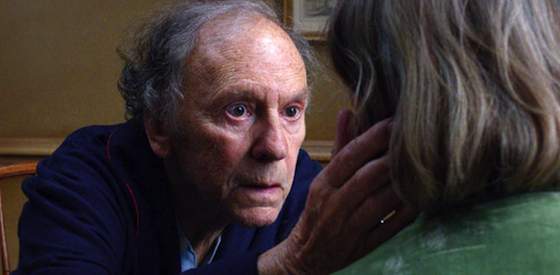- MENU
- HOME
- SEARCH
- WORLD
- MAIN
- AFRICA
- ASIA
- BALKANS
- EUROPE
- LATIN AMERICA
- MIDDLE EAST
- United Kingdom
- United States
- Argentina
- Australia
- Austria
- Benelux
- Brazil
- Canada
- China
- France
- Germany
- Greece
- Hungary
- India
- Indonesia
- Ireland
- Israel
- Italy
- Japan
- Korea
- Mexico
- New Zealand
- Pakistan
- Philippines
- Poland
- Russia
- South Africa
- Spain
- Taiwan
- Turkey
- USA
- BUSINESS
- WEALTH
- STOCKS
- TECH
- HEALTH
- LIFESTYLE
- ENTERTAINMENT
- SPORTS
- RSS
- iHaveNet.com: Movie Reviews

4 stars
We know how "Amour" will end, at least for one of its characters.
Writer-director Michael Haneke opens his film with a scene of Paris firefighters breaking into the spacious, eerily silent apartment belonging to two retired musicians, played by Jean-Louis Trintignant and Emmanuelle Riva. The couple, Georges and Anne, has not been heard from in a few days. One fireman covers his nose with a cloth; there's no fire, no smoke, but then we discover Anne's body, her deathbed pillow strewn, just so, with flower petals. And "Amour" travels back to relay how she came to her final resting place.
Small, sure and stunningly acted, this is a picture of exacting control, which is to be expected from Haneke, whose works include "Cache" and "The White Ribbon," and whose "Funny Games," "The Piano Teacher" and others taunted audiences with meticulous exercises in narrative cruelty. "Amour" is no stranger to that sensibility; at one point, in fact, before we know him well, Georges is described by Anne, sweetly: "You're a monster sometimes." Even so, "Amour" is not kidding about its title, which comes crashing into the opening sequence just as the corpse is revealed.
Above all the film offers the pleasure of watching two giants of European cinema, the 82-year-old Trintignant and the 85-year-old Riva, navigate a script requiring a lot of its interpreters. At the outset (after the prologue), this is a charmed older couple, comfortable, intellectually vital, playful with each other. They attend a classical piano concert performed by one of Anne's former students. They come home a few hours after an apparent attempted burglary; no harm done, except to the front door lock, but an unsettling detail.
The next morning, at the kitchen table, after serving her husband a hard-boiled egg, Anne sits in her chair and enters a trance state. This is the beginning of a new phase for Anne, clouded with challenges. She endures a stroke, an unsuccessful surgery, another stroke and partial paralysis. The couple's daughter, played by Isabelle Huppert, is unhappily married in London to a fellow musician. The relationship between daughter and parents has grown thick with small talk and wary defenses. On his own as long as he can manage, Georges copes valiantly with the caretaking, though his steely side comes out in an exchange with a less-than-admirable home-care nurse, and in testy moments of interior crisis.
Trintignant starred in "The Conformist," the 1970 Bernardo Bertolucci film, and in that script the protagonist's fiancee says at one point: "I really must go to a fortuneteller. I want to know everything about you." There's something sly and unreadably catlike in Trintignant's half-smile, and it's still there in "Amour," though Georges must witness the downward spiral of the woman of his life, day by difficult day.
Riva, by contrast, appears to hide nothing from the camera. While "Amour" is very much a male-perspective story of old age's ravages, it is the female who suffers (always), and Riva delineates the physical and mental decline of this proud, imperious woman with an utter mastery of craft. Haneke's patience with the camera, his willingness to allow a two-person scene to develop on its own time, becomes a gift to these actors. "It's touching," Riva tells Trintignant, after the decline has begun, "all you do to make it bearable." The film's formal progression may at times verge on relational science-fiction -- was any couple ever really this genteel and unflappable, even when tested so severely? -- but that's Haneke: a control freak with an unexpected humanist streak. There are moments in "Amour," when Georges assists Anne with her toilet or her wheelchair, that are staged like bittersweet parodies of old forgotten intimacies.
"It's beautiful," Anne says, leafing through a photo album after the dementia has crept onto the scene. What? Georges wonders. "Life," she says. "So long. Long life." The faces in the album are those of Riva when she was young, Trintignant was he was young, Huppert when she was younger. "Amour" has its own answer (or rather Georges') to the question of how best to deal with the mortal coil. It's quintessential Haneke, but it's also something new and freer; you don't feel the actors or the characters are being puppeteered by the man behind the camera. Riva and Trintignant were destined to make this harsh, beautiful picture together.
MPAA rating: PG-13 (for mature thematic material including a disturbing act, and for brief language).
Running time: 2:07.
Cast: Jean-Louise Trintignant (Georges); Emmanuelle Riva (Anne); Isabelle Huppert (Eva).
Credits: Written and directed by Michael Haneke; produced by Margaret Menegoz. A Sony Pictures Classics release.
Copyright © Tribune Media Services, Inc.
Amour Movie Review - Jean-Louise Trintignant and Emmanuelle Riva